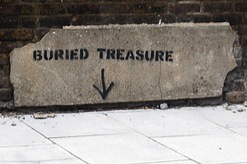In a recent post, Elizabeth Merritt, the founder of the American Association of Museum's Center for the Future of Museums, gave a good synopsis of impending threats to nonprofit status that the arts may well be facing in the near (or immediate) future. (Dark Futures: Nonprofit Fragmentation) The essence of the argument is that in a time of budgetary despair for government, there is great pressure to examine the legitimacy of the tax benefits … [Read more...]
Go to the Gemba
Show of hands. Who knows what the title of this post means? As I've mentioned before, my son is a higher ed IT management consultant. From him I learn many fascinating things about what's going on in the world of management theory and practice. Recently he told me that one of his favorite approaches–Lean, derived from Toyota's management style in the 1980's (which was the heart of Japan's conquering the automobile industry)–incorporates the … [Read more...]
Painful Insight
This is a post I did not want to write, about a thought I *really* do not want to have. I love Shakespeare. After a rocky beginning with what to me was then an incomprehensible text (Julius Caesar) in tenth grade English, my life was changed by performing in Macbeth my senior year. Yes, a high school production of "the Scottish play." Our drama instructor was a "sin boldly" kind of guy. I doubled as Banquo and the Doctor and got into stage … [Read more...]
Core Business
I continue to be thinking about basic issues for arts institutions. Here are some thoughts about core business. There is a story–that I have always assumed to be apocryphal–of the dance company manager, newly hired in November, who observed that his troupe sold thousands of ticket and made tens of thousands of dollars with their production of The Nutcracker. His conclusion was that his audience loved lavish ballets by Tchaikovsky. The next … [Read more...]
Want-Need: “Them”?
Two of my favorite bloggers, Nina Simon and Diane Ragsdale, have recently weighed in on the want vs. need argument. Since this is a topic I have addressed a couple of times before, I wanted to expand upon the discussion a bit from my perspective. It is reasonable to assume we know some things the general public does not about how the arts can address their needs. For instance, if there is a need to address issues surrounding race relations, … [Read more...]
Gravity
I'm not one to spend much money when I go to the movies. I wait until they are on Netflix or go to discount matinees. I prefer the word thrifty to cheap, but if the shoe fits . . . . That's why it was so remarkable that I chose to see Gravity (yep, George Clooney and Sandra Bullock) in IMAX 3-D. I spent three or four times what I would normally pay for a movie ticket to do so. . . . And I would do it again. This is not a movie review (although … [Read more...]
Enrich @#!*$@
Rant du jour: the word "enrich" in mission statements. Yes, it is important to enrich people's lives–make them more enjoyable, more fulfilling, more meaningful. However, so often when the word is used in mission or vision statements, that's the only reference to interacting with the public. It is, of course, better than focusing on the art to the exclusion of the community, but stopping at "enrich" sells the arts short. If the arts are only … [Read more...]
Inside/Outside
This is yet another example of how it's nearly impossible for me to get away from things that tie in to the content of this blog. In September, during my trip to California to work with James Irvine Foundation grantees, I took some time to "play" in Napa Valley. One stop was at the Robert Mondavi Winery. We took an official tour led by one of Mondavi's wine chemists. This was a man whose passion and life work is great wine. He knows his stuff and … [Read more...]
Discovering Humility
Expertise and passion are essential for the creation and presentation of art. At the same time, expertise and passion can be roadblocks to reaching communities. They separate us from those without them and make communicating difficult. It is a challenge for the passionate expert to understand those who do not share his or her knowledge and point of view, and it requires almost superhuman effort for the expert not to be seen as condescending. … [Read more...]
Magical Thinking
In discussion of the need for change in the arts industry, I am often met with responses that can only be classified as magical thinking. Such comments generally fall into one of two categories. The first holds that, while serious problems exist, all will be well if someone else does things to fix them. The second simply changes the subject, not addressing the question of whether a problem exists, choosing rather to criticize the idea of … [Read more...]








